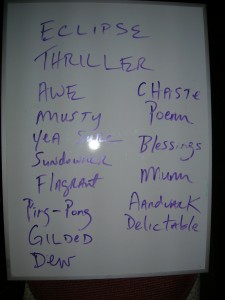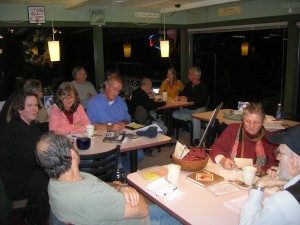Submitted by Jim Freeman
We call them
Slams
Although they’re
Hugs
For twenty years
Weaving poetry rugs
Held once monthly
In area pubs
And coffee shops
And classroom rubs
We pick words
At least three
To write in 20 minutes
One’s poetry
Read your poem
Feel the love
Know the comfort
No push or shove
Overcome fear
Overwhelm joy
Poetry slams
Your poetry toy
Mission: To provide a comfortable and welcome setting in which to write poetry.
Where: Pubs, coffeehouses, schools, local fun-raisers, any place where pencil, pen,and paper can gather.
When: As needed, but monthly, on any day, at any time. For twenty years, we have held slams in a two hour time frame, on Wednesday’s, between 6pm-9pm.
Who: Sponsors, if needed, can be as varied as the participants who support the fun; Anyone can have a poetry slam. At the dinner table, around the picnic table, anywhere where words can flow. Our sponsor for twenty years has been the Whidbey Island Arts Council. The WIAC support enables us to compensate the hosts, provide sound, and offer fun prizes and/or prize money to participants.
What & How:
A Poetry Slam, Whidbey Island style, involves the host inviting suggestions of three or more words from the audience, or judges. The suggested words are to be used as a common thread for a spontaneous, free-form creation by those in attendance. Within 20-25 minutes, the poems are written. Then the poems are shared aloud with one another. Competitions can be created, prizes given, or merely classroom instruction for all involved.
So, What’s the Point of a Poetry Slam? : Having had the pleasure of hosting the monthly Whidbey Island Arts Council sponsored poetry slams since 1993, I can share unequivocally that all attending, whether they participate in writing a poem on the spot or not, will have a fun time, will feel comfortable sharing their improvisational creation, and will leave with a positive reminder of the multitudinous joys of poetry.
For more specific information, please contact Jim Freeman by e-mail at fun@whidbey.com or by calling 360-331-2617.
An Example Poem by Drew Kampion, 11/14/12
Poem Awe Dew
The immortals set sail,
a sundowner drifting out in scant wind
towards a gilded horizon.
Their aim – their wish, really –
to bring blessings to the edge of the world.
These immortals – this gathering –
replete with delectable opportunity:
Ulysses taking up a paddle
to do battle with Thor –
ping-pong on the aft deck.
Cyrus and Leandra in a casual game of chess
that quick became a thriller
when Hermes snatched the queen’s rook,
which brought Pele to her feet
to call the flagrant foul.
And so on, they drifted, as the sun
settled towards that crisp edge of horizon
and Hercules did pushups at the bar.
It was Jesus, finally, who prepared the celebratory nectar,
passed it to Gautama to sample,
and when he pronounced it a bit musty but drinkable,
shushed him with a “Ya-sure!”
“Mum’s the Word,” he spaketh
through chaste lips
just as Muhammed’s aardvark let out a squeal
to see the golden orb plunge suddenly
into the darkness of eclipse,
leaving the immortals helpless.
words: eclipse, thriller, awe, musty, sundowner, flagrant, delectable,
ping-pong, gilded, dew, poem, blessings, mum, aardvark, chaste, yasure

